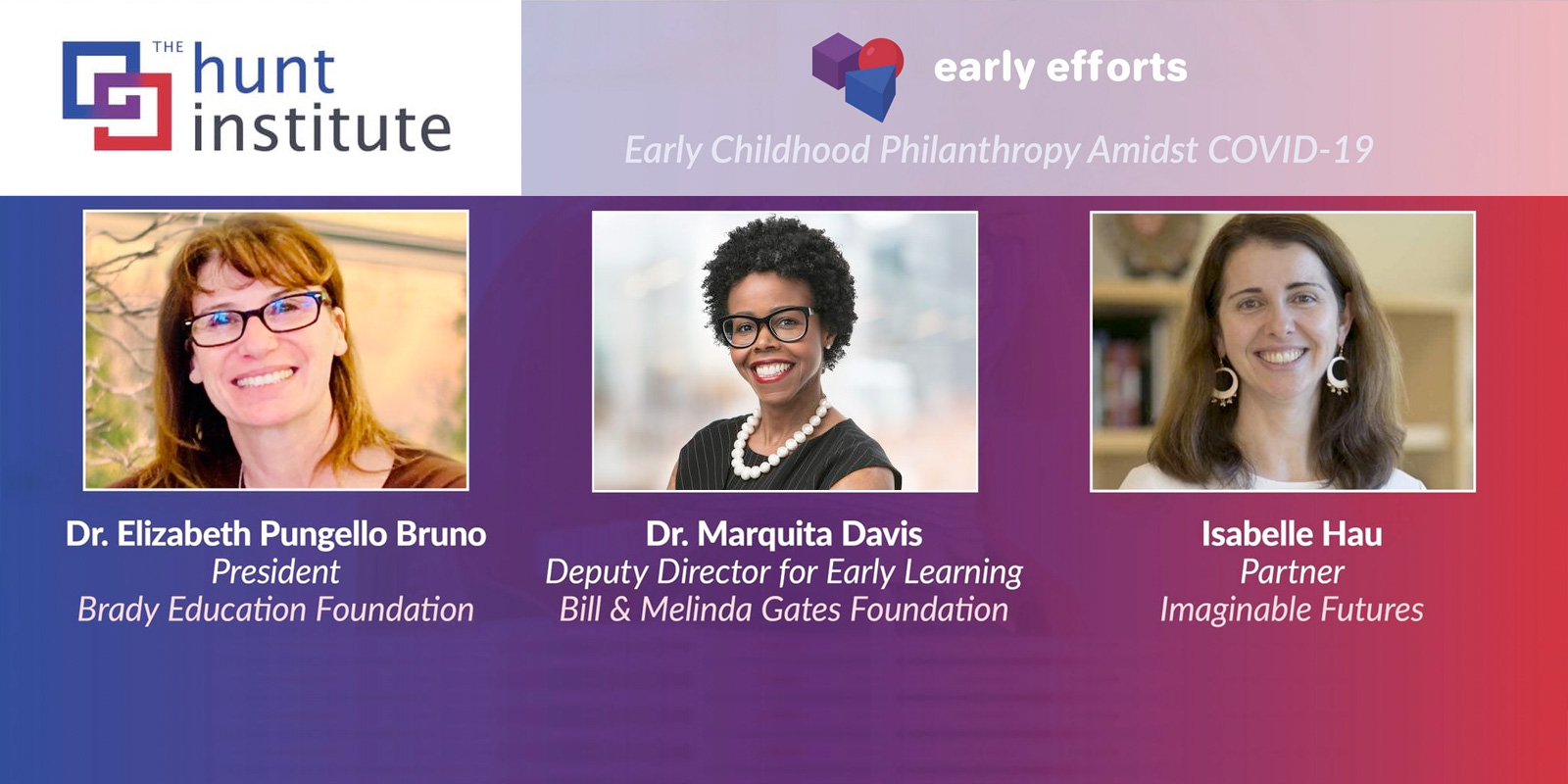Because we can’t take our Early Learning Nation Studio on the road during this time, stay tuned as ELN recaps Top Takeaways from important webinars, town halls and virtual events from the Early Learning field. Read them all and join the conversation! And visit our Early Learning Nation channel on YouTube for interviews with leaders from education, child development, business, politics and more.
The pandemic isn’t letting us get back to business as usual yet. In the case of foundations with missions centered on young children, it’s compelling a thorough re-evaluation of assumptions and methods. Making grants the way foundations did in 2019 would mean overlooking acute crises in communities across the country as well as the underlying inequities that Covid has exposed.
Foundation officers not only see the importance of expediting support to children whose households are at greatest risk of the health and economic fallout—they also recognize that even the foundations with largest coffers will achieve greater impact through collaboration. This is no time to go it alone.
On September 1, the Hunt Institute presented the third in a series of conversations on this topic, featuring:
- Dr. Marquita Davis, Deputy Director for Early Learning at the Bill and Melinda Gates Foundation
- Isabelle Hau, Partner at Imaginable Futures
- Dr. Elizabeth Pungello Bruno of the Brady Education Foundation
Dan Wuori, The Hunt Institute’s Director of Early Learning, once again moderated the conversation. He set the scene by reminding the participants of steep declines in state revenues and the resulting reductions in pre-K funding. Here are our takeaways from the conversation.
👉 Our Top Takeaways from the June 16 conversation
👉 Our Top Takeaways from the July 21 conversation
The COVID crisis reveals the fragility of child care as one of the most inequitable "non-system". Philanthropy can support w/ relief, as well as w/ a collective reimagining of how early care & education is a human right for all children & families @imaginablefut #EarlyEfforts https://t.co/fjTXulPgcm
— Isabelle Hau (@Volcoucou) September 3, 2020
4. Data matters. While Dr. Davis underscored the importance of data by saying, “Without benchmarking, we can’t measure progress,” it’s safe to say that nobody on the panel appreciated data quite like Dr. Bruno. Her organization makes grants for research and program evaluation rather than operational support, and at first she felt sidelined by the pandemic, but then it hit her: We need data today more than ever, so we know what works and what doesn’t. “Research,” she said, “allows and forces us to hold ourselves accountable.” Referring to the troubling history of social science, she admitted, “The early seminal studies we all cite were racist. I know—I took part.” To rectify this situation, she called for putting researchers of color on leadership teams.Philanthropy must examine its own histories, biases & processes & adopt explicit practices to ensure philanthropy uses its power to ensure the communities impacted by those processes and served by those programs have leadership roles in those conversations. #EarlyEfforts https://t.co/rGlz3WoOkY
— Elizabeth Pungello Bruno (@PungelloBruno) September 3, 2020
5. Solutions abound. “Philanthropy is risk capital,” Hau said. “We can demonstrate what’s possible so public dollars can scale up.” She said she was pleased to see collaboration among unusual suspects during the pandemic, citing the private sector’s support of child care for essential workers as an example, which she called “infrastructure investment that’s here to stay.” Collaboration with other sectors enables foundations to think bigger and more ambitiously.We need to ensure parents’ voices inform the practices and policies we implement to respond. Have learned that it’s even more difficult now to reach the ones we need to hear from most given the virtual world we live in now (e.g., lack of internet access). #EarlyEfforts https://t.co/B1cXyolYmO
— Elizabeth Pungello Bruno (@PungelloBruno) September 3, 2020
https://twitter.com/Volcoucou/status/1301548263997280256?s=20

Mark Swartz
Mark Swartz writes about efforts to improve early care and education as well as developments in the U.S. care economy. He lives in Maryland.



